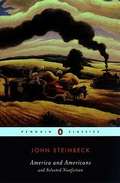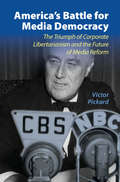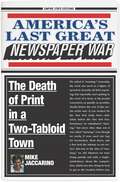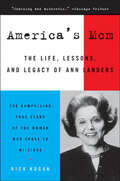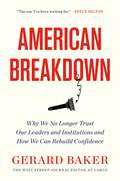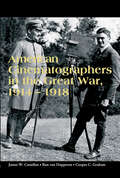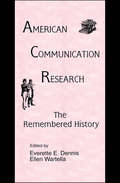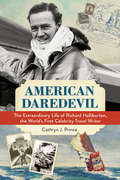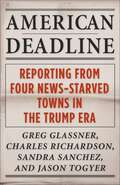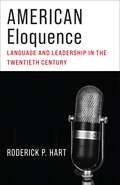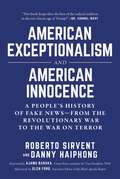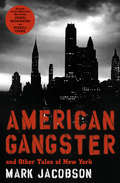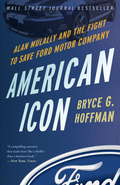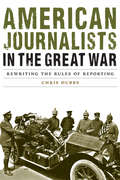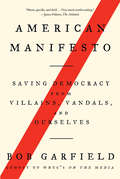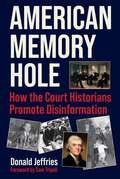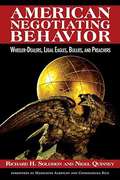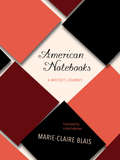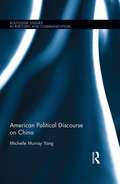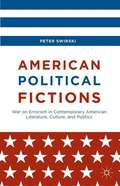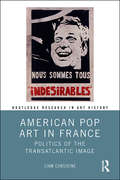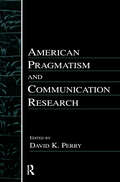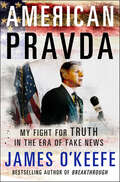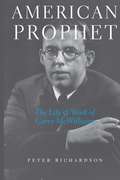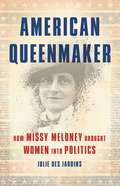- Table View
- List View
America and Americans and Selected Nonfiction
by John Steinbeck Susan Shillinglaw Jackson J. BensonMore than four decades after his death, John Steinbeck remains one of the nation's most beloved authors. Yet few know of his career as a journalist who covered world events from the Great Depression to Vietnam. Now, this distinctive collection offers a portrait of the artist as citizen, deeply engaged in the world around him. In addition to the complete text of Steinbeck's last published book, America and Americans, this volume brings together for the first time more than fifty of Steinbeck's finest essays and journalistic pieces on Salinas, Sag Harbor, Arthur Miller, Woody Guthrie, the Vietnam War and more. This edition is edited by Steinbeck scholar Susan Shillinglaw and Steinbeck biographer Jackson J. Benson. .
America's Battle for Media Democracy
by Victor PickardHow did the American media system become what it is today? Why do American media have so few public-interest regulations compared with other democratic nations? How did the system become dominated by a few corporations, and why are structural problems like market failures routinely avoided in media-policy discourse? By tracing the answers to many of these questions back to media-policy battles in the 1940s, this book explains how this happened and why it matters today. Drawing from extensive archival research, the book uncovers the American media system's historical roots and normative foundations. It charts the rise and fall of a forgotten media-reform movement to recover alternatives and paths not taken. As much about the present and future as it is about the past, the book proposes policies for remaking media based on democratic values for the digital age.
America's Last Great Newspaper War: The Death of Print in a Two-Tabloid Town
by Mike JaccarinoNAMED A BEST BOOK OF THE WEEK BY THE NEW YORK POSTALSO AVAILABLE AS AN AUDIOBOOKA from-the-trenches view of New York Daily News and New York Post runners and photographers as they stop at nothing to break the story and squash their tabloid arch-rivals.When author Mike Jaccarino was offered a job at the Daily News in 2006, he was asked a single question: “Kid, what are you going to do to help us beat the Post?” That was the year things went sideways at the News, when the New York Post surpassed its nemesis in circulation for the first time in the history of both papers. Tasked with one job—crush the Post—Jaccarino here provides the behind-the-scenes story of how the runners and shooters on both sides would do anything and everything to get the scoop before their opponents.The New York Daily News and the New York Post have long been the Hatfields and McCoys of American media: two warring tabloids in a town big enough for only one of them. As digital news rendered print journalism obsolete, the fight to survive in NYC became an epic, Darwinian battle. In America’s Last Great Newspaper War, Jaccarino exposes the untold story of this tabloid death match of such ferocity and obsession its like has not occurred since Pulitzer– Hearst.Told through the eyes of hungry “runners” (field reporters) and “shooters” (photographers) who would employ phony police lights to overcome traffic, Mike Jaccarino’s memoir unmasks the do-whatever-it-takes era of reporting—where the ends justified the means and nothing was off-limits. His no-holds-barred account describes sneaking into hospitals, months-long stakeouts, infiltrating John Gotti’s crypt, bidding wars for scoops, high-speed car chases with Hillary Clinton, O.J. Simpson, and the baby mama of a philandering congressman—all to get that coveted front-page story.Today, few runners and shooters remain on the street. Their age and exploits are as bygone as the News–Post war and American newspapers, generally. Where armies once battled, often no one is covering the story at all.Funding for this book was provided by: Furthermore: a program of the J. M. Kaplan Fund
America's Mom: The Life, Lessons, and Legacy of Ann Landers
by Rick KoganFor two generations of Americans, reading Ann Landers's daily column was as important as eating breakfast. For nearly fifty years an entire nation turned to this quick-witted, worldly-wise counselor for advice on everything from dinner etiquette to sex. But who was the woman behind the byline?Iowa-born Eppie Lederer was first hired by the Chicago Sun-Times to take over the daily advice column in 1955 -- and over the next half-century she helped shape the nation's social and sexual landscape. Award-winning journalist Rick Kogan was Ann Landers's last editor and close friend, and he paints a fascinating, full-bodied account of the triumphs, the wisdom, the courage, and the trials of one of the twentieth century's most enduring icons -- including her painful lifelong feud with her identical twin sister, "Dear Abby"; her stubborn refusal to shy away from even the most controversial topics; and the tragic breakup of her own thirty-six-year marriage. Filled with remarkable stories shared by people from all walks of life who were profoundly affected by the good sense and guidance of Ann Landers, America's Mom is a moving tribute to a singular woman who has earned an eternal place in our culture ... and our hearts.
American Breakdown: Why We No Longer Trust Our Leaders and Institutions and How We Can Rebuild Confidence
by Gerard BakerFrom the former editor-in-chief of the Wall Street Journal, a must-read account of how America suffers from a &“trust deficit&” that has weakened its cornerstone institutions and divided our society. AMERICAN BREAKDOWN dissects how, in the space of a generation, the pillars that sustained the once-dominant superpower have been dangerously eroded. From government to business, from media to medicine—the strength and security of the American experiment have been weakened by a widening gap between the elites who control these institutions and the public. At the root of this breakdown is a precipitous fall in Americans&’ trust in their political, business and cultural leaders. As Baker writes, &“This pathology of distrust across American society is eating the country away from the inside.&” Millions of Americans say they have little faith in their country's future, and no longer seem to have trust in their leaders, in their important social and civil institutions, even in their common values and ideals, or ultimately in each other. America in fact hasn&’t failed. Americans have been failed—misled by inept and deceitful political leaders, deserted by predatory and cynical corporate chiefs, and, above all, betrayed by a cultural elite that has exploited the very freedom this country provided in order to destroy it. AMERICAN BREAKDOWN is a deep analysis and thought-provoking account that explores the ways in which Americans have been let down and offers solutions for how we rebuild trust and reclaim purpose for a better future.
American Cinematographers in the Great War, 1914–1918
by James W. Castellan Ron van Dopperen Copper C. GrahamA history of American cameramen covering the news of World War I, from the dangerous front line and the risk of execution to red tape and censorship.At the start of hostilities in World War I, when the United States was still neutral, American newsreel companies and newspapers sent a new kind of journalist, the film correspondent, to Europe to record the Great War. These pioneering cameramen, accustomed to carrying the Kodaks and Graflexes of still photography, had to lug cumbersome equipment into the trenches. Facing dangerous conditions on the front, they also risked summary execution as supposed spies while navigating military red tape, censorship, and the business interests of the film and newspaper companies they represented. Based on extensive research in European and American archives, American Cinematographers in the Great War, 1914–1918 follows the adventures of these cameramen as they managed to document and film the atrocities around them in spite of enormous difficulties.“The first book to explore the work and working conditions of American cinematographers active on the different fronts of the First World War. It is a pioneering study which has already attracted a good deal of attention in the academic and archive world.” —Historical Journal of Film, Radio and Television
American Communication Research: The Remembered History (Routledge Communication Series)
by Ellen Wartella Everette E. DennisThis book captures the essence of a never-to-be-repeated glimpse at the history of media research. It offers a unique examination of the origins, meaning, and impact of media and communication research in America, with links to European antecedents. Based on a high-level seminar series at Columbia University's Freedom Forum Media Studies Center, the book features work by leading scholars, researchers, and media executives. Participants in the series have called the program "heroic and unprecedented." The book encompasses essays, commentaries, and reports by such leading figures as William McGuire, Elihu Katz, and Leo Bogart, plus posthumous reports by Wilbur Schramm, Malcolm Beville, and Hilde Himmelweit. It also contains original insights on the collaboration of Frank Stanton, Paul Lazarfeld, and Robert K. Merton.
American Daredevil: The Extraordinary Life of Richard Halliburton, the World's First Celebrity Travel Writer
by Cathryn PrinceWith a polished walking stick and neatly pressed trousers, Richard Halliburton served as an intrepid globetrotting guide for millions of Americans in the 1920s and '30s. Readers waited with bated breath for each new article and book he wrote. During his career, Halliburton climbed the Matterhorn, nearly fell out of his plane while shooting the first aerial photographs of Mt. Everest, and became the first person to swim the Panama Canal. With his matinee idol looks, the Tennessee native was a media darling in an era of optimism and increased social openness. But as the Great Depression and looming war pushed America toward social conservatism, Halliburton more actively worked to hide his homosexuality, burnishing his image as a masculine trailblazer. As chronicled in American Daredevil, Halliburton harnessed the media of his day to gain and maintain a widespread following long before our age of the 24-hour news cycle, and thus became the first celebrity adventure journalist. And during the darkest hours of the Great Depression, Halliburton did something remarkable: he inspired generations of authors, journalists, and everyday people who dreamt of fame and glory to explore the world.
American Deadline: Reporting from Four News-Starved Towns in the Trump Era (Columbia Journalism Review Books)
by Charles Richardson Greg Glassner Sandra Sanchez Jason TogyerThe dramatic events of 2020—the presidential election, the COVID-19 pandemic, protests for racial justice—affected every corner of American life. What did these events mean for the residents of small towns and cities that are often overlooked by national newspapers? How do local stories change when they are told by journalists with roots in these communities? And what is lost as this kind of coverage disappears?American Deadline brings together dispatches from four longtime local journalists in different parts of the United States that tell the story of 2020 anew. It shares reporting from Bowling Green, Virginia; Macon, Georgia; McKeesport, Pennsylvania; and McAllen, Texas—two towns that lost their local newspapers and two where they are barely hanging on. The authors consider what makes each town distinctive and how these local perspectives tell a part of a broader American story. This book reports on how residents of these towns grapple with and talk about issues relating to race, schooling, health, immigration, deindustrialization, as well as local and national politics amid a changing and increasingly precarious information ecosystem. A distinct and intimate look at a calamitous year, American Deadline is an important book for all readers interested in the possibilities and future of local journalism.
American Eloquence: Language and Leadership in the Twentieth Century
by Roderick P. HartWhat makes political speech powerful? How does eloquent rhetoric transcend ordinary language? Which stylistic choices allow effective orators to stir emotions and spur action? And in the age of Donald Trump, does political eloquence still matter?This book examines a wide swath of political discourse to shed new light on the meaning and significance of eloquence. Roderick P. Hart, a leading scholar of political communication, develops new ways of measuring persuasiveness and rhetorical power through the use of computer-based methods. He examines one hundred of the most important speeches of the twentieth century, given by presidents and politicians as well as leaders, activists, and cultural figures including Martin Luther King Jr., Lou Gehrig, Mario Savio, Carrie Chapman Catt, and Stokely Carmichael.Deploying the tools of the digital humanities as well as critical rhetorical analysis, Hart considers what distinguishes the linguistic properties of iconic oratory from those of more mundane texts. He argues that eloquence represents the confluence of cultural resonance, personal investment, and poetic imagination, providing empirical metrics for assessing each of these qualities. A quantitative and qualitative exploration of American political speech, this interdisciplinary book offers a powerful argument for why eloquence is essential for a functioning democracy.
American Exceptionalism and American Innocence: A People's History of Fake News—From the Revolutionary War to the War on Terror
by Sirvent Roberto Haiphong DannyDid the U.S. really “save the world” in World War II? Should black athletes stop protesting and show more gratitude for what America has done for them? Are wars fought to spread freedom and democracy? Or is this all fake news?American Exceptionalism and American Innocence examines the stories we’re told that lead us to think that the U.S. is a force for good in the world, regardless of slavery, the genocide of indigenous people, and the more than a century’s worth of imperialist war that the U.S. has wrought on the planet. Sirvent and Haiphong detail just what Captain America’s shield tells us about the pretensions of U.S. foreign policy, how Angelina Jolie and Bill Gates engage in humanitarian imperialism, and why the Broadway musical Hamilton is a monument to white supremacy.
American Gangster: And Other Tales of New York (Books That Changed the World)
by Mark JacobsonThe “riveting account” of a Harlem drug kingpin—the basis for the Ridley Scott film starring Denzel Washington and Russell Crowe (Entertainment Weekly).In the 1970s, Frank Lucas was the king of the Harlem drug trade, bringing in over a million dollars a day. So many heroin addicts were buying from him on 116th Street that he claimed the Transit Authority changed the bus routes to avoid them. He lived a glamorous life, hobnobbing with athletes, musicians, and politicians, but Lucas was a ruthless gangster. He was notorious for using the coffins of dead GIs to smuggle heroin into the United States and, before being sentenced to seventy years in prison, he played a major role in the near death of New York City. In American Gangster, Mark Jacobson’s captivating account of the life of Frank Lucas (the basis for the major motion picture) joins other tales of New York City from the past few decades. The collection features a number of Jacobson’s most famous essays, as well as previous unpublished work and recent articles on 9/11 conspiracy theorists, America’s #1 escort, and Harlem’s own Charles Rangel, the retired chairman of the House Ways and Means Committee. American Gangster is a vibrant, many-layered portrait of the most fascinating city in the world, by one of the most acclaimed journalists of our time.“Gripping reading . . . Whether covering the high life or lowlifes, Jacobson boasts a novelistic eye and muscular prose in the tradition of urban chroniclers like Joseph Mitchell, A.J. Liebling, and Pete Hamill. A-.”—Entertainment Weekly“Mark Jacobson is a living American Master.”—New York Daily News
American Icon: Alan Mulally and the Fight to Save Ford Motor Company
by Bryce G. HoffmanTHE INSIDE STORY OF THE EPIC TURNAROUND OF FORD MOTOR COMPANY UNDER THE LEADERSHIP OF CEO ALAN MULALLY. At the end of 2008, Ford Motor Company was just months away from running out of cash. With the auto industry careening toward ruin, Congress offered all three Detroit automakers a bailout. General Motors and Chrysler grabbed the taxpayer lifeline, but Ford decided to save itself. Under the leadership of charismatic CEO Alan Mulally, Ford had already put together a bold plan to unify its divided global operations, transform its lackluster product lineup, and overcome a dysfunctional culture of infighting, backstabbing, and excuses. It was an extraordinary risk, but it was the only way the Ford family--America's last great industrial dynasty--could hold on to their company. Mulally and his team pulled off one of the greatest comebacks in business history. As the rest of Detroit collapsed, Ford went from the brink of bankruptcy to being the most profitable automaker in the world. American Icon is the compelling, behind-the-scenes account of that epic turnaround. On the verge of collapse, Ford went outside the auto industry and recruited Mulally--the man who had already saved Boeing from the deathblow of 9/11--to lead a sweeping restructuring of a company that had been unable to overcome decades of mismanagement and denial. Mulally applied the principles he developed at Boeing to streamline Ford's inefficient operations, force its fractious executives to work together as a team, and spark a product renaissance in Dearborn. He also convinced the United Auto Workers to join his fight for the soul of American manufacturing. Bryce Hoffman reveals the untold story of the covert meetings with UAW leaders that led to a game-changing contract, Bill Ford's battle to hold the Ford family together when many were ready to cash in their stock and write off the company, and the secret alliance with Toyota and Honda that helped prop up the American automotive supply base. In one of the great management narratives of our time, Hoffman puts the reader inside the boardroom as Mulally uses his celebrated Business Plan Review meetings to drive change and force Ford to deal with the painful realities of the American auto industry. Hoffman was granted unprecedented access to Ford's top executives and top-secret company documents. He spent countless hours with Alan Mulally, Bill Ford, the Ford family, former executives, labor leaders, and company directors. In the bestselling tradition of Too Big to Fail and The Big Short, American Icon is narrative nonfiction at its vivid and colorful best.
American Journalists in the Great War: Rewriting the Rules of Reporting (Studies in War, Society, and the Military)
by Chris DubbsWhen war erupted in Europe in 1914, American journalists hurried across the Atlantic ready to cover it the same way they had covered so many other wars. However, very little about this war was like any other. Its scale, brutality, and duration forced journalists to write their own rules for reporting and keeping the American public informed.American Journalists in the Great War tells the dramatic stories of the journalists who covered World War I for the American public. Chris Dubbs draws on personal accounts from contemporary newspaper and magazine articles and books to convey the experiences of the journalists of World War I, from the western front to the Balkans to the Paris Peace Conference. Their accounts reveal the challenges of finding the war news, transmitting a story, and getting it past the censors. Over the course of the war, reporters found that getting their scoop increasingly meant breaking the rules or redefining the very meaning of war news. Dubbs shares the courageous, harrowing, and sometimes humorous stories of the American reporters who risked their lives in war zones to record their experiences and send the news to the people back home.
American Manifesto: Saving Democracy from Villains, Vandals, and Ourselves
by Bob GarfieldDo you fear for our democracy? Are you perplexed by Trumpism? Are you ready to throw in the towel? Don’t! This is your guidebook to reassembling our hyperpolarized American society in six (not–so–easy) steps, written by cohost of WNYC's On the Media Bob GarfieldAs is often observed, Trump is a symptom of a virus that has been incubating for at least fifty years. But not often observed is where the virus is imbedded: in the psychic core of our identity. In American Manifesto: Saving Democracy from Villains, Vandals, and Ourselves, popular media personality Bob Garfield examines the tragic confluence of the American preoccupation with identity and the catastrophic disintegration of the mass media. Garfield investigates how we’ve gotten to this moment when our identity is threatened by both the left and the right, when e pluribus unum is no longer a source of national pride, and why, when looking through this lens of identity, the rise of Trumpism is no surprise. Overlaying this crisis is the rise of the Facebook–Google duopoly and the filter bubble of social media, where identity is insular and immutable.But fear not! WNYC’s On the Media cohost Garfield has ideas about how we may counter the forces of fragmentation—the manifesto itself: six steps to take to reassemble our fractured society. A quick, fascinating read, American Manifesto offers not only a vision of a country in extremis, but also a plan for how to address the ways in which our democracy is imperiled. Provocative, profound, and sometimes hilariously profane, American Manifesto is a call to action like no other.
American Memory Hole: How the Court Historians Promote Disinformation
by Donald JeffriesDonald Jeffries takes another deep dive down the historical rabbit holes with American Memory Hole: How the Court Historians Promote Disinformation. You will discover how cancel culture was born during the administration of Franklin D. Roosevelt. And how our interventionist foreign policy was established during the Woodrow Wilson presidency. Jeffries documents the tragically common atrocities committed by US troops, beginning with the Mexican-American War, which became official policy under the &“total war&” and &“scorched earth&” strategy of Abraham Lincoln&’s bloodthirsty generals. He recounts the shocking abuses of our military forces, in countries like Mexico, Haiti, the Philippines, and elsewhere. Jeffries builds on his groundbreaking investigation into the murder of John F. Kennedy, Jr., uncovering even more evidence of conspiracy and cover-up. He talked to people no researcher has talked to before, in a powerful new section on the assassination of President John F. Kennedy. Jeffries explores the Kennedy family in general, and finds that the establishment, especially the Left, continues to treat them unfairly. The events of September 11, 2001, and the Oklahoma City Bombing are investigated in depth as never before. There is stunning new information on much maligned Senator Joseph McCarthy, who emerges here not as some irredeemable monster, but as a genuine American patriot who has been demeaned in death even more than he was in life. The reader will never look at the supposed heroes and villains of American history the same way again after reading this book. History is written by the victors.
American Negotiating Behavior: Wheeler-Dealers, Legal Eagles, Bullies, and Preachers
by Madeleine Albright Condoleezza Rice Richard H. Solomon Nigel QuinneyThis landmark study offers a rich and detailed portrait of the negotiating practices of American officials. It assesses the multiple influences cultural, institutional, historical, and political that shape how American policymakers and diplomats approach negotiations with foreign counterparts and highlights behavioral patterns that transcend the actions of individual negotiators and administrations. <P><P>Informed by discussions and interviews with more than fifty seasoned foreign and American negotiators, Richard H. Solomon and Nigel Quinney argue that four distinctive mind-sets have combined to shape U.S. negotiating practice: a businessperson s pragmatic quest for concrete results, a lawyer s attention to detail, a superpower s inclination to dictate terms, and a moralizer s sense of mission. The authors examine how Americans employ time, language, enticements, and pressure tactics at the negotiating table, and how they use (or neglect) the media, back channel communications, and hospitality outside the formal negotiating arena. They also explore the intense interagency rivalries and congressional second-guessing that limit U.S. negotiators freedom to maneuver.A chapter by the eminent historian Robert Schulzinger charts the evolving relationship between U.S. presidents and their negotiators, and the volume presents a set of eight remarkably candid foreign perspectives on particular aspects of American negotiating behavior. These chapters are written by a distinguished cast of ambassadors and foreign ministers, some from countries allied to the United States, others from rivals or adversaries and all with illuminating stories to tell.In the concluding chapter, Solomon and Quinney propose a variety of measures to enhance America s negotiating capacities to deal with the new and emerging challenges to effective diplomacy in the 21st century. <P><P>Contributors: Gilles Andreani Chan Heng Chee David Hannay Faruk Logoglu Lalit Mansingh Yuri Nazarkin Robert Schulzinger Koji Watanabe John Wood"
American Notebooks: A Writer's Journey
by Marie-Claire BlaisIt is the spring of 1963. The young Quebec author Marie-Claire Blais, bursting with energy and talent, has just won a coveted Guggenheim fellowship. She chooses Cambridge, Massachusetts, as the place where she will begin her writer's apprenticeship with her mentor, Edmund Wilson. American Notebooks is much more than a fascinating autobiographical account of the intellectual flowering of a great writer. An album of exquisitely drawn literary portraits of companions, intellectuals, writers, musicians, artists and social activists of the period--Edmund and Elena Wilson; Mary Meigs; Maud Maugan; Barbara Deming; Truman Capote; Jacques Hébert, her first Quebec publisher, then senator; and many others--it also introduces many of the real life personalities who have inspired her fictional characters.
American Political Discourse on China (Routledge Studies in Rhetoric and Communication)
by Michelle Murray YangDespite the U.S. and China’s shared economic and political interests, distrust between the nations persists. How does the United States rhetorically navigate its relationship with China in the midst of continued distrust? This book pursues this question by rhetorically analyzing U.S. news and political discourse concerning the 2008 Beijing Olympic Games, the 2010 U.S. midterm elections, the 2012 U.S. presidential election, and the 2014-2015 Chinese cyber espionage controversy. It finds that memory frames of China as the yellow peril and the red menace have combined to construct China as a threatening red peril. Red peril characterizations revive and revise yellow peril tropes of China as a moral, political, economic and military threat by imbuing them with anti-communist ideology. Tracing the origins, functions, and implications of the red peril, this study illustrates how historical representations of the Chinese threat continue to limit understanding of U.S.-Sino relations by keeping the nations’ relationship mired in the past.
American Political Fictions
by Peter SwirskiAmerican Political Fictions rewrites the book on American political art in a myth-busting study that ranges from historical 'faction' and apocalyptic thrillers to satirical fiction, rap poetry, TV'sThe West Wing, and not least the make-believe that streams out of the White House. It critically, not to say skeptically, sieves out historical facts from a sea of partisan and bipartisan disinformation in order to forge a more accurate picture of contemporary American culture and, through it, of America itself. In the process, it elucidates the ideological underpinnings, cultural manifestations, and democratic essence of contemporary political art - and of the partisan politics on which it feeds.
American Pop Art in France: Politics of the Transatlantic Image (Routledge Research in Art History)
by Liam ConsidinePop art was essential to the Americanization of global art in the 1960s, yet it engendered resistance and adaptation abroad in equal measure, especially in Paris. From the end of the Algerian War of Independence and the opening of Ileana Sonnabend’s gallery for American Pop art in Paris in 1962, to the silkscreen poster workshops of May ’68, this book examines critical adaptations of Pop motifs and pictorial devices across French painting, graphic design, cinema and protest aesthetics. Liam Considine argues that the transatlantic dispersion of Pop art gave rise to a new politics of the image that challenged Americanization and prefigured the critiques and contradictions of May ’68.
American Pragmatism and Communication Research (Routledge Communication Series)
by David K. PerryThis monograph examines the past, present, and potential relationship between American pragmatism and communication research. The contributors provide a bridge between communication studies and philosophy, subjects often developed somewhat in isolation from each other. Addressing topics, such as qualitative and quantitative research, ethics, media research, and feminist studies, the chapters in this volume: *discuss how a pragmatic, Darwinian approach to inquiry has guided and might further guide communication research; *advocate a functional view of communication, based on Dewey's mature notion of transaction; *articulate a pragmatist's aesthetics and connect it to Deweyan democracy; *discuss the similarities and differences between Dewey's notion of inquiry and the philosophical hermeneutics of Hans-Georg Gadamer; *apply accommodation theory, linked to symbolic interactionism and more generally to the social behaviorism of George H. Mead and his followers, to media research; *interpret media-effects evidence in light of pragmatist ideas about inquiry; and *argue that pragmatism theorizes about despair and life's sense of the tragic. This book is written to be readily accessible to students and professional academics within and outside the field of communication studies without extensive training in specialized areas of communication study.
American Pravda: My Fight for Truth in the Era of Fake News
by James O'KeefeThe one real difference between the American press and the Soviet state newspaper Pravda was that the Russian people knew they were being lied to. To expose the lies our media tell us today, controversial journalist James O’Keefe created Project Veritas, an independent news organization whose reporters go where traditional journalists dare not. Their investigative work–equal parts James Bond, Mike Wallace, and Saul Alinsky—has had a consistent and powerful impact on its targets.In American Pravda, the reader is invited to go undercover with these intrepid journalists as they infiltrate political campaigns, unmask dishonest officials and expose voter fraud. A rollicking adventure story on one level, the book also serves as a treatise on modern media, arguing that establishment journalists have a vested interest in keeping the powerful comfortable and the people misinformed.The book not only contests the false narratives frequently put forth by corporate media, it documents the consequences of telling the truth in a world that does not necessarily want to hear it. O’Keefe’s enemies attack with lawsuits, smear campaigns, political prosecutions, and false charges in an effort to shut down Project Veritas. For O’Keefe, every one of these attacks is a sign of success.American Pravda puts the myths and misconceptions surrounding O’Keefe’s activities to rest and will make you rethink every word you hear and read in the so-called mainstream press.
American Prophet: The Life & Work of Carey McWilliams
by Peter RichardsonA long-overdue book on the brilliant life and career of one of our greatest public intellectuals, American Prophet will introduce Carey McWilliams to a new generation of readers. Peter Richardson's absorbing and elegantly paced book reveals a figure thoroughly engaged with the issues of his time. Deftly interweaving correspondence, diary notes, published writings, and McWilliams's own and others' observations on a colorful and influential cast of characters from Hollywood, New York, Washington, DC, and the American West, Richardson maps the evolution of McWilliams's personal and professional life. Among those making an appearance are H. L. Mencken (McWilliams's mentor and role model), Louis Adamic, John Fante, Robert Towne, Richard Nixon, Studs Terkel, J. Edgar Hoover, Arthur Schlesinger, Jr., and Joseph McCarthy. American Prophet illustrates the arc of McWilliams's life and career from his early literary journalism through his legal and political activism, his stint in state government, and his two decades as editor of the Nation. This book makes the case for McWilliams's place in the Olympian realm of our most influential and prescient political writers.
American Queenmaker: How Missy Meloney Brought Women Into Politics
by Julie Des JardinsThe first biography of Missy Meloney, the most important woman you've never heard of Marie "Missy" Mattingly Meloney was born in 1878, in an America where women couldn't vote. Yet she recognized the power that women held as consumers and family decision-makers, and persuaded male publishers and politicians to take them seriously. Over the course of her life as a journalist, magazine editor-in-chief, and political advisor, Missy created the idea of the female demographic. After the passage of the 19th Amendment she encouraged candidates to engage with and appeal to women directly. In this role, she advised Presidents from Hoover and Coolidge to FDR. By the time she died in 1943, women were a recognized political force to be reckoned with.In this groundbreaking biography, historian Julie Des Jardins restores Missy to her rightful place in American history.
